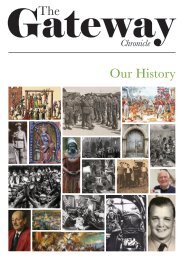Create successful ePaper yourself
Turn your PDF publications into a flip-book with our unique Google optimized e-Paper software.
73<br />
“some elements of government<br />
policy would<br />
suggest they intervened<br />
more in the free market”<br />
the number of Friendly Societies with the<br />
Friendly Societies Act of 1793. Furthermore,<br />
in 1807<br />
Britain abolished<br />
the<br />
slave trade.<br />
Adam Smith<br />
argued in his<br />
book this was<br />
a policy that<br />
would protect<br />
the free<br />
market, as<br />
paying workers ensures they are more efficient.<br />
<strong>The</strong> government also supported<br />
banking in their free-market approach as,<br />
in 1826, the government removed limits<br />
on the number of joint-stock banks.<br />
tax, which especially affected the rich as<br />
incomes over £200 were taxed 10%. <strong>The</strong><br />
tax would not only be used to finance<br />
the War as Robert Peel reintroduced it<br />
in 1846 to fund a deficit. Additionally,<br />
in 1807 the orders-in-council were issued<br />
by the British government<br />
known as the Ministry of all Talents.<br />
<strong>The</strong>se forbade British trade with<br />
France, its allies, or any neutral European<br />
country in the War. However,<br />
these trade barriers must be viewed<br />
only as a necessary War measure.<br />
Moreover, the fact the tax was repealed in<br />
1816 by Lord Liverpool, which suggests<br />
the government were sticking to laissezfaire<br />
policy. <strong>The</strong>se were not the only trade<br />
barriers introduced as, in 1815, the corn<br />
laws were introduced which placed a tariff<br />
on grain imports. However, these were<br />
repealed in 1846 by Peel, showing they<br />
were only used as a temporary and necessary<br />
measure<br />
to protect<br />
British<br />
landowners.<br />
However, some elements of government<br />
policy would suggest they intervened<br />
more in the free market. This was espe-<br />
<strong>The</strong> war with France prompted the<br />
introduction of income tax<br />
cially true in the 1793-<br />
1815 War with France.<br />
In 1799, to finance the War, Prime Minister<br />
Pitt was forced to introduce an income<br />
Overall,<br />
the government<br />
were<br />
committed<br />
to<br />
laissezfaire<br />
policies<br />
as<br />
they ensured<br />
industrial<br />
growth<br />
for Britain<br />
and<br />
they<br />
would<br />
only<br />
move away from laissez-faire policies<br />
when it was necessary in the War with<br />
France.<br />
Joe, L6AJG


















